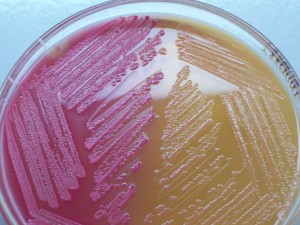Escherichia coli O157: H7 is a particularly dangerous strain of the bacterium Escherichia coli, commonly known as E. coli. There are many strains of E. coli, but most are harmless, some of which even live in the intestines of humans and other animals without causing damage. However, a few strains, such as Escherichia coli O157: H7 can cause very harmful symptoms to their victims, such as vomiting and bloody diarrhoea. In some cases, it has lead to kidney failure and even death. The strain Escherichia coli O157: H7 produces a toxin called Shiga toxin, also known as Shiga toxin-producing E. coli (STEC).
Causes of Escherichia coli O157: H7 Infection
There are several ways wherein E. coli can get into the food, which include:
- Meat or poultry that comes into direct contact with E. coli found in the animal intestines while being processed
- Use of water contaminated with animal or human waste during growing or shipping
- Poor handling of food during transport or storage
- Unsafe food handling or preparation in home, restaurants, or grocery stores
Moreover, even if food is handled and stored properly, there are still several ways on how food poisoning can occur after eating or drinking:
- Preparation by a person who did not wash their hands well before commencing preparation
- Usage of unclean cooking utensils, cutting boards, or other tools
- Storage or dairy products or mayonnaise-containing foods for too long
- Improper storage or improper reheating of frozen or refrigerated foods
- Fish or oysters
- Raw fruits or vegetables that have not been washed properly
- Raw fruits or vegetable juices and dairy products
- Undercooked meats or eggs
- Drinking or usage of untreated waters
Symptoms of Escherichia coli O157: H7 Infection
The incubation period of Escherichia coli O157: H7 is typically one to ten days, wherein symptoms usually last for five to ten days. If complications, such as hemolytic uremic syndrome (HUS), develop, there is generally a longer healing period. Signs and symptoms of Escherichia coli O157: H7 infection include:
- Vomiting
- Severe diarrhoea, often bloody
- Severe abdominal pain
- Gas
- Little or no fever
- Loss of appetite
First Aid Management for Escherichia coli O157: H7 Infection
The main goal for treatment for Escherichia coli O157: H7 infection is to treat the symptoms and avoid dehydration from occurring. The following tips can help manage a Escherichia coli O157: H7 infection:
- Take plenty of rest.
- Drink eight to ten glasses of clear fluids, preferably water.
- Drink oral rehydration mixtures to replace lost minerals and fluids.
- Instead of eating three big meals, eat small meals instead.
- Put some salty food in the diet, such as pretzels, soup, and sports drinks.
Escherichia coli O157: H7 Add foods high in potassium, such as bananas, potatoes without the skin and fruit juices with plenty of water.
- It is not ideal to take anti-diarrheal medications as it may cause the infection to last longer.
Disclaimer: This article does not provide medical advice and should not be substituted for formal training. The information given should not be used for self-diagnosis. Seek medical attention when necessary. It is important to recognise potential medical emergencies at all times to avoid complications from developing. To learn more about how to manage Escherichia coli O157: H7 infection, enrol in First Aid Courses and CPR Courses with Red Cross Training.
Online Sources:
http://www.foodsafety.gov/poisoning/causes/bacteriaviruses/ecoli/
http://www.nlm.nih.gov/medlineplus/ency/article/000296.htm

